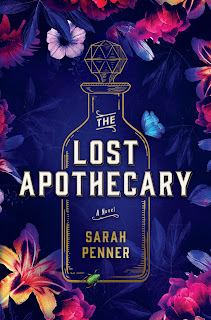The Lost Apothecary
It’s fitting that I write this review today, because 230 years ago today on Feb. 10, 1791, the events that changed the lives of our three main characters: Nella, Eliza and Caroline took place.
Who are these three?
First, there’s Nella, the apothecary. Her timeline takes place in 1791. After the death of her mother 20 years prior, she’s been running her mother’s apothecary shop which has had a long history of helping women with whatever ails them. The only difference is that where her mother only sought to help women with their health afflictions, Nella, for reasons her own, also secretly dispenses poisons to women who request it to “remedy” the husbands, lovers, fathers, brothers, or whichever other male has crossed them.
Eliza, the maidservant of one of Nella’s clients, is a 12-year old girl who befriends Nella when sent to get poison at the bidding of her mistress, Mrs. Amwell. It’s lovely little Eliza who innocently sets in motion the events that change the lives of these three ladies.
Jump to the present day timeline, where we meet Caroline, a history buff, who’s gone on a trip to London that was meant as a ten-year anniversary gift for she and her husband, James, but through circumstance, now finds herself there solo. On a whim one day, she goes mudlarking (discovering buried treasures hidden in the river’s mud) at the River Thames where she discovers a mysterious blue vial that, unbeknownst to her, ties back to Nella and Eliza. In her efforts to find out more about this vial, the story of the past comes to life.
I won’t go into all the details of the story, because it’s better to let it tell itself, but this fascinating womens’/historical fiction shines a light on issues experienced by women, both past and present, as they deal with the implications of their place in society. In 1791, that means Nella, Eliza, and the other women of their day having almost no power to right the wrongs they’re experiencing - at least legally, and in the present day, it’s more about how women, like Caroline, often suppress or abandon their own goals in pursuit of keeping harmony in their homes.
Despite the themes, I don’t think the intention of the book is to hate on men or paint them in the light that they’re only capable of harming women in some way, nor is it to glorify women harming them in return. Rather, this story illuminates the path that these womens’ choices put them on and the overall effects those choices have on them.
I enjoyed both the past and present storylines. Nella and Eliza’s almost mother-daughter-like friendship is sweet, as is the friendship that develops between Caroline and Gaynor, a librarian at the British Library who helps her research the vial. It’s a journey of intrigue, mystery and discovery as the dual storylines unfold. Nella and Eliza’s story has palpable tension as the repercussions of their choices made on and around February 10 come to light, and in the present, it’s one of self-discovery for Caroline, as she uncovers, not only the past, but a clear path for her future. It’s a quieter, slower story. It didn’t grab me and scream in my face for attention - thank goodness - but it beckoned me into these ladies’ lives, nonetheless, and it was a lovely little journey that I recommend you take as well. Sarah Penner has offered a wonderful debut!
★★★★
Thank you to NetGalley, Harlequin - Trade Publishing and Sarah Penner for this ARC in exchange for my honest review. It will be published March 2, 2021.

.jpg)

Comments
Post a Comment